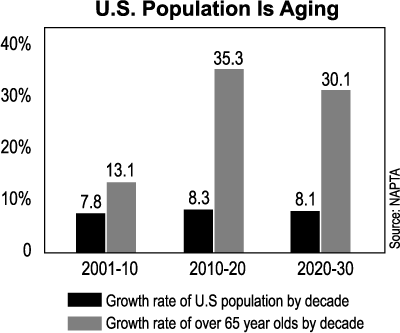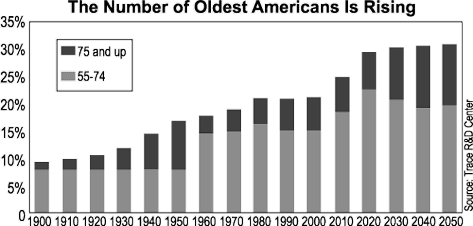
Absolutely the Safest Long-Term Trend in the Market
By Dr. David Eifrig, editor, Retirement Millionaire
Saturday, May 14, 2011One of the important themes in my Retirement Millionaire advisory is picking stock investments that
will do well in good times and bad.
You see, contrary to what you hear from a lot of advisors, I believe the economy is in a "gradually
getting better" mode. It's not overheating due to inflation. And it's not beginning to tank like a lot
of fear-driven analysts claim it is.
That's why I like owning elite, dividend-paying providers of the "basics," like food and fuel. Everyone
eats and drives. Everyone is still going to get a small bit of pleasure from drinking a Coca-Cola
product. And everyone is going to take care of their health, which is why owning companies like
Johnson & Johnson is such a great idea.
Even better, health care companies have one of the world's greatest tailwinds at their backs.
This tailwind is hands-down the safest long-term trend in the market today…
The U.S. population is aging. It's an investment cliché at this point, but bear with me:
There's powerful data backing it up. Let me show you what I'm talking about…
Take a look at the chart below. It shows how the growth rate of the 65-year-old set will
explode in the next 20 years in the United States. This is the Baby Boomer crowd getting older:
Take the numbers out another couple decades, and you can see just how huge the trend is.
The chart below shows how the number of 75 year olds (and older) will increase in the next
40 years.
More elderly people means more money spent on health care.
Unless everyone starts following my recommendations for walking, yoga, meditation, and diet,
these demographic patterns mean an explosion in the use of pharmaceutical drugs for the elderly.
For better or worse, most folks just want a pill to make everything better.
Older people use three to four times the amount of prescription drugs as folks under 50.
And more than 30 million people will gain Medicare coverage by 2014. This means an increasing
number of written prescriptions.
Right now, only 10% of Medicare dollars are spent on pharmaceuticals. If Washington starts
looking for cost-effective ways to manage health, prescription drugs will be a quick and easy
way to test its hypothesis. In many cases, drugs can ward off diseases for many years. For
example, doctors already know blood-pressure pills and diabetes medications prolong lives
cheaply.
This demographic shift means big opportunities for companies delivering drugs. Pharmaceuticals
could easily grow to 15%-16% of the Medicare pie this decade. And the over-the-counter
markets will grow along with it.
What the demographics come down to, though, is that companies providing quality health care
goods and services at fair prices to this aging U.S. population will enjoy relentless sales and profit
growth, no matter what happens in Washington.
Take Eli Lilly, for example. Around a year ago, I recommended the pharmaceutical company to
readers of my Retirement Millionaire advisory. Eli Lilly discovered and marketed insulin, which
turned diabetes from a fatal disease to a chronic condition. It produced the first drugs for anemia,
also once a fatal disease. It was one of the first to mass-produce penicillin. The list goes on and
on… it has a history of selling big drugs that help a lot of people.
That history is going to continue and grow as the population ages. In good times and bad, Lilly's
products will be in big – and growing – demand.
Even better, Lilly has paid a dividend for 125 consecutive years and increased it 42 years in a row.
This is an extraordinary commitment to treating shareholders well. It's a commitment we should
all demand of our long-term investments.
While I expect the economy to gradually get stronger over the coming years, I'm not blind to the
risks we face in America. That's why I lean toward investments that can prosper in good times
and bad – companies that enjoy "big trend" tailwinds and have long histories of paying dividends.
With plenty of uncertainty facing us in the coming years, these types of investments have never
been more important.
Here's to our health, wealth, and a great retirement,
Saturday, 14 May 2011
Posted by
Britannia Radio
at
20:40
![]()





















